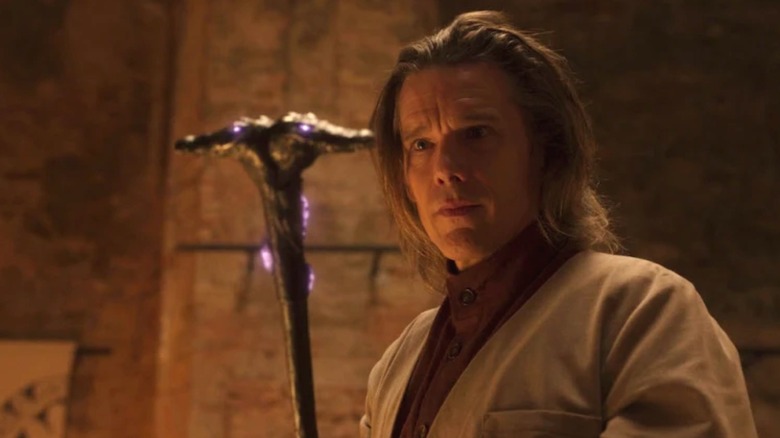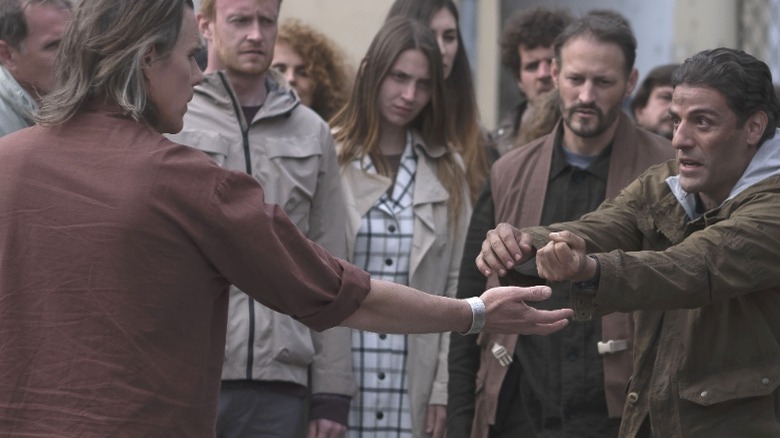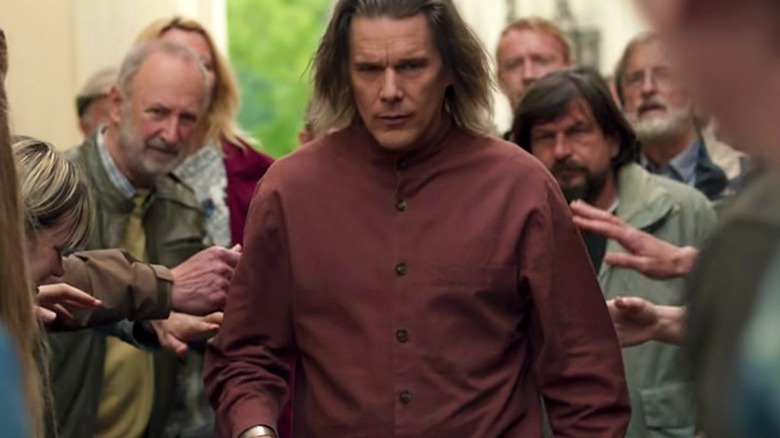Ethan Hawke's Low-Key Moon Knight Villain Is A Refreshing Change Of Pace For Marvel
This article contains major spoilers for the first two episodes of "Moon Knight."
Villains in the Marvel Cinematic Universe are generally heavy-handed. Just think about Thanos and his need to annihilate half of the universe due to a misguided need to resolve conflict over resources. While Marvel villains have been invested with shades of grey before — a key example being Loki's redemption arc in "Loki" — "Moon Knight" introduces a big baddie who is terrifying because of how understated and reined-in he is.
Yes, we are talking about Ethan Hawke's Arthur Harrow, the "sane lunatic" whose agenda involves resurrecting the Egyptian goddess Ammit to bring about "heaven on earth," which completely aligns with the cult leader persona that defines how he looks and acts. After all, Hawke's performance was inspired by the likes of real-life cult leader David Koresh, with sprinklings of Carl Jung, making for a compelling, calculated villain who genuinely believes that his actions stem from a place of love. If that is not genuinely unsettling, I don't know what is.
The king of well-intentioned malice
In "The Goldfish Problem," Harrow is first introduced as a well-spoken, influential cult leader, who almost never loses his composure even when he straight-up murders people. Blessed with a fraction of Ammit's powers, Harrow's scale tattoo allows him to play judge, jury, and executioner while deciding whether any given person is worthy of life based on what evil deed they might do in the future. The moral implications and ethical conundrums of this worldview aside, Harrow displays absolutely no remorse while condemning a fellow cult member to instant death. Instead, he calmly tells an elderly woman that he's "sorry" she won't be part of the world they remake in Ammit's vision, and drains her of life in a second.
Of course, there is something inherently wrong with Harrow's vision, which is pointed out by Steven Grant (Oscar Isaac) in episode 2 when Moon Knight's more gullible persona is lured inside Harrow's commune. Questioning Harrow's actions, Steven asks how he can be okay with preemptive judgement of evil — a thought can be evil, but it is just a thought, dormant in the psyche until it is translated into an act of evil. Steven furthers his argument by asking whether Ammit is okay with killing children, who are innocent in the moment and require societal support and integration instead of being judged harshly by Harrow's death scales. Needless to say, Harrow is not pleased to be questioned.
In retaliation, Harrow does not physically intimidate Steven with violence, nor does he go into a fit of rage (although his followers menacingly circle him). He justifies his actions by stating it is for the greater good, and that Ammit's judgement is not to be questioned, as it is swift, relentless, and effective, as opposed to Khonshu's, which is ill-timed and fruitless. He tries to make Steven comfortable in his commune, and even tries to reason with him. That reasoning is flawed and dangerous, but he genuinely believes he is making a difference, and Hawke wisely chooses to play Harrow as a man who is utterly convinced he is making a logical choice.
Gaslight, gatekeep, girlboss
Harrow emerges as an arch manipulator, who recognizes Steven's internal conflict and struggles with dissociation and attempts to weaponize it in his favour. Revealing that he was Khonshu's former avatar, Harrow pretends to empathise with Steven's condition, highlighting how, he too, was a mere pawn at the hands of powerful deities, exploited and bound to servitude for ends that do not align with his worldview. While his empathy is performative and insincere for the most part, there is a kernel of truth in his words: Khonshu is using Marc as his pawn, weaponizing the fact that he saved the mercenary's life and blessed him with his protection, using him as a killing machine to enact vengeance as per his convenience.
When Harrow walks Steven through his commune, he seems to be a pretty okay guy: he is on good terms with everyone who lives there, provides them with food and shelter, and seems to be a fair, compassionate leader who cares about their lives. Only, he does not, and the character's calm, brutal mindset is revealed in the scene in which one of his followers finds the scarab on the ground. Even though they hand it over to Harrow without a fight, he kills them without hesitation, before muttering: "I can offer you everything — food, shelter — but I cannot offer you this."
Hawke himself called Harrow a "sane malevolent force," which is a perfect summation of the character so far. The moment Steven refuses to reveal the location of the golden scarab and Layla (May Calamawy), Harrow brings out the big guns and summons an Egyptian jackal to hound the pair (this is not the first time he has done this, as he set one of the beasts on Steven at the end of episode 1). He is ruthlessly driven in his devotion to Ammit, a demoness figure who was historically feared in Egypt, and will stop at nothing to achieve his warped view of a sinless world where it is okay to kill anyone at the drop of a hat if it leads to the "eradication" of evil.
Now that Harrow has the scarab in his possession — meaning that he can now resurrect Ammit and unleash her onto the world — things are bound to get more tense and skewed in "Moon Knight," and it's up to Marc and his alters to stop this travesty (read: the end of the world as we know it) from happening.
The first two episodes of "Moon Knight" are currently streaming on Disney+.


